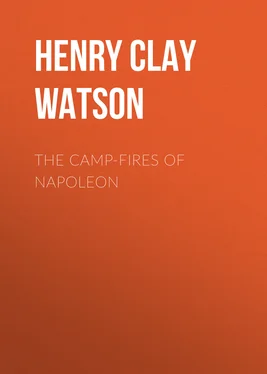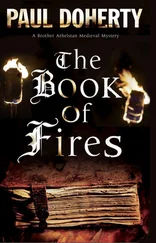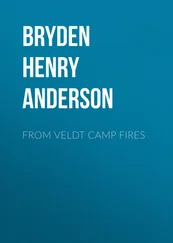Henry Clay Watson - The Camp-fires of Napoleon
Здесь есть возможность читать онлайн «Henry Clay Watson - The Camp-fires of Napoleon» — ознакомительный отрывок электронной книги совершенно бесплатно, а после прочтения отрывка купить полную версию. В некоторых случаях можно слушать аудио, скачать через торрент в формате fb2 и присутствует краткое содержание. Жанр: foreign_prose, foreign_antique, на английском языке. Описание произведения, (предисловие) а так же отзывы посетителей доступны на портале библиотеки ЛибКат.
- Название:The Camp-fires of Napoleon
- Автор:
- Жанр:
- Год:неизвестен
- ISBN:нет данных
- Рейтинг книги:4 / 5. Голосов: 1
-
Избранное:Добавить в избранное
- Отзывы:
-
Ваша оценка:
- 80
- 1
- 2
- 3
- 4
- 5
The Camp-fires of Napoleon: краткое содержание, описание и аннотация
Предлагаем к чтению аннотацию, описание, краткое содержание или предисловие (зависит от того, что написал сам автор книги «The Camp-fires of Napoleon»). Если вы не нашли необходимую информацию о книге — напишите в комментариях, мы постараемся отыскать её.
The Camp-fires of Napoleon — читать онлайн ознакомительный отрывок
Ниже представлен текст книги, разбитый по страницам. Система сохранения места последней прочитанной страницы, позволяет с удобством читать онлайн бесплатно книгу «The Camp-fires of Napoleon», без необходимости каждый раз заново искать на чём Вы остановились. Поставьте закладку, и сможете в любой момент перейти на страницу, на которой закончили чтение.
Интервал:
Закладка:
“But to make soldiers worthy of France, we must alter that;” replied Bonaparte, “one and all must be taught to fight for glory, and then our arms will be irresistible.”
La Harpe shook his head. But the enthusiastic Duroc, catching the noble fire of his illustrious friend, exclaimed.
“Yes, the love of glory makes the true soldier! This will cause the troops to forget their toilsome, bare-foot marches, and their long days of hunger! And never have I seen the French soldiers more eager for conflict in defence of their country’s honor, than they have been since our young general took command of the army of Italy. That first proclamation gave them a new spirit, which has been growing stronger every day. There are splendid triumphs before us, I am sure.”
The face of Bonaparte expressed nothing of the emotions which must have heaved in his soul at these words. But he grasped the hand of Duroc and shook it warmly.
“My friends,” said he, “it is all clear enough to me. To-morrow will be a great day for France. Old Beaulieu will begin to know his enemy. The plain before us shall be the scene of more Austrian astonishment and dismay than has been known in Italy for many years. Beaulieu supposes that I intended to file off along the coast to Genoa; whereas, here I am, ready to overwhelm his centre. Following up this victory, it will be easy to cut him off from communication with the Piedmontese.”
The officers gazed with wonder and admiration upon the stripling who was thus summarily disposing of the fate of armies and countries, and while they listened to his words of conscious power, an awe crept over them, they felt themselves in the presence of a superior being; and yet among them were several men of splendid qualities,—born to command.
By this time the groups around the fires had stretched themselves upon the hard earth to repose, and the pacing of the sentinels alone disturbed the stillness of the scene, where thousands of brave warriors submitted to the conqueror, sleep. Bonaparte and his officers returned to a house in the little village of Monte Notte, which had been selected as the quarters for the night. And the army slumbered on, beneath the sweet vigil of the moon, and beside the cheerful warmth of the camp-fires until the cold, white light in the east told that the most glorious king of day, who has arisen and set upon so many fields of conflict, was about to ascend the heavens.
“Far off his coming shone,”
and the stars soared out of sight, and the moon slowly faded to vapor, as the white light turned to a golden glow.
Then was heard the roll of the reveillé. With astonishing rapidity, the French were under arms and in motion. Bonaparte and his staff rode to an elevated knoll, commanding the whole plain, and then were ordered the movements which gave to the young commander-in-chief the victory of Monte Notte. D’Argenteau, the Austrian commander, found himself attacked upon one side by the divisions of La Harpe, Cervoni and Augereau, and upon the other by Massena. Then boomed the cannon, and the rattled musketry over the plain. The Austrian infantry sustained the conflict with admirable courage. But they were surrounded by superior forces and after several charges had been made by the French, in the full confidence of victory, the discomfited d’Argenteau was compelled to retreat towards Dego. In fact, the retreat was a disorderly flight. The French made two thousand prisoners, and several hundred Austrians were left dead on the field. The centre of the Austrian army had been completely overwhelmed. Bonaparte was the victor of Monte Notte. In after years, when the imperial crown adorned his brow, the conqueror showed his contempt for ancestral distinctions by saying that he dated his title to rule from this battle.
THE CAMP-FIRE AT MONDOVI
When the conflict is at an end, and the awful silence of night descends upon the field where stark and stiff lie the mangled dead, among the broken weapons and spoils of the fight, the scene is fearfully impressive. There lie the cold forms of those, who in life were furious foes; but in death, side by side, united in their doom of darkness, they are all clay together. The bugle and the drum, which were sounded to signal the contest, are broken beside the mutilated and bloody bodies of those who played them at the head of the marching regiments. The captain, whose gallant “forward!” roused the spirits of his men, lies where he perished, in the van. The standard-bearer still clasps a portion of that dear symbol of his country, which numbers cut from his hands, and seems to have yielded his breath, while hugging that remnant to his heart. The grim veteran of a hundred fights, to whom death has been a jeer and a mockery, and the youth, with blooming cheek and eager eye, who left his mother’s cottage high in the hope of a glorious renown, are found cold and stiff together; the one with a smile of scorn curling his lip, the other with the keen agony, kindled by the rushing remembrance of the dear home lost forever, pictured in his countenance. The meek moon and the sentinel stars shining on this field of death, with a pallid light, add to its horrors, increasing the ghastly hue in the faces of the slain.
Such a scene was presented on the night of the 22nd of April, 1796, after the desperate battle of Mondovi. Near the town of that name, the dispirited army of Colli had been overtaken by two divisions of Bonaparte’s army, commanded by Serrurier and Massena. Serrurier had been repulsed, but the onset of Massena was irresistible, and the enemy were attacked on both flanks at once. The cavalry of the Piedmontese over powered and drove back that of the French, but the wonderful valor of Murat, the most glorious of cavalry officers, renewed the fortune of the day, and, shortly afterwards, Colli’s army was put to flight. During the retreat, the Piedmontese suffered dreadfully, losing the best of their troops, their cannons, baggage and appointments.
Wearied with the desperate conflict, the greater portion of the victorious army encamped in and about the town of Mondovi, a body of cavalry, alone pursuing and harassing the enemy. The description of the field of battle given above, will apply to this one, with the addition of a view of the towers and spires of Mondovi, and of numerous blazing fires in the vicinity, around which the exhausted troops had sunk to repose. Bonaparte had arrived; and, now, having gathered his principal officers at a ruined building, just outside of the town, which seemed to have been an old chapel, talked over with them the achievements of the day, and what was contemplated for the morrow. The ruin consisted of four broken walls, and was entirely roofless. It was several yards square, and the floor was strewn with fragments of sculpture which had once adorned the edifice. In the centre of the floor a fire was kindled, and camp-stools were ranged around it. At some distance from the ruin, guards were placed, with orders to keep the inquisitive beyond ear-shot. This place had evidently been selected by Bonaparte, in preference to the best mansion of Mondovi, to be secure from the treachery of Italians, who might have overheard and communicated to the enemy important information.
As usual, Bonaparte had the paper containing the lines of his movements before him, and with pencil and compasses in hand, he devised and marked alterations even while he talked. Among the officers gathered around the fire, were Massena, Berthier, Serrurier, Murat and Duroc.
Next to the commander-in-chief himself, Massena had the most remarkable personal appearance of any of the group. His massive features had a somewhat Jewish cast and their general expression was extremely heavy, or rather drowsy. The eyes were half-closed, and they did not sparkle like those of the rest, when Bonaparte spoke. Yet it was well known that, when excited by the storm of battle, their flash was terrible. The expression of the mouth, was always that of an inexorable will. The whole aspect of Andrew Massena was that of a man of great powers, difficult to rouse. Napoleon himself remarked that it was only in danger that appalled most men, that Massena acquired clearness and force of thought. His want of activity was his great defect as a commander.
Читать дальшеИнтервал:
Закладка:
Похожие книги на «The Camp-fires of Napoleon»
Представляем Вашему вниманию похожие книги на «The Camp-fires of Napoleon» списком для выбора. Мы отобрали схожую по названию и смыслу литературу в надежде предоставить читателям больше вариантов отыскать новые, интересные, ещё непрочитанные произведения.
Обсуждение, отзывы о книге «The Camp-fires of Napoleon» и просто собственные мнения читателей. Оставьте ваши комментарии, напишите, что Вы думаете о произведении, его смысле или главных героях. Укажите что конкретно понравилось, а что нет, и почему Вы так считаете.












